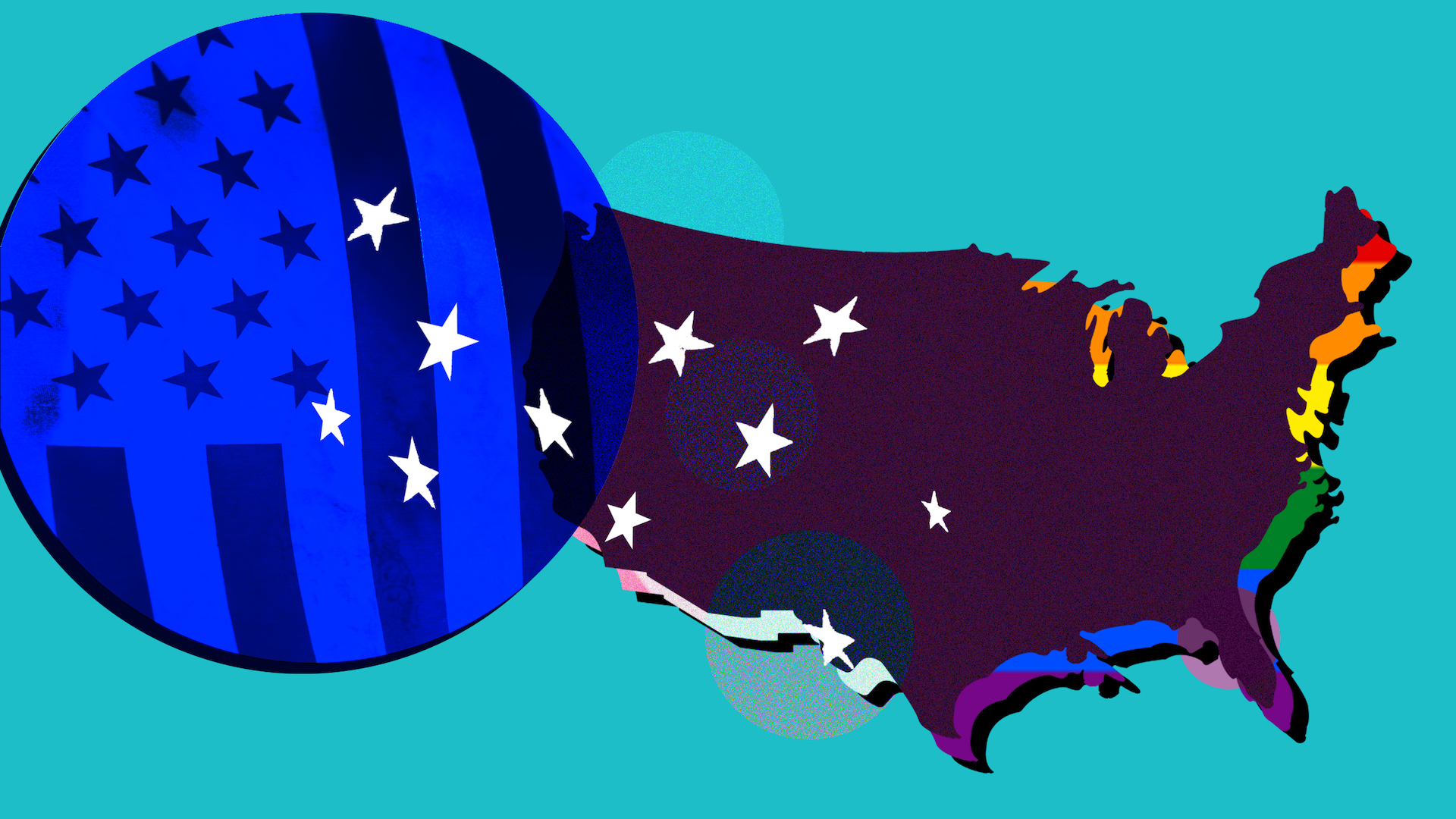Florida’s “Don’t Say Gay” bill has been met with nationwide criticism since Gov. Ron DeSantis signed the legislation into law last week.
Known formally as the “Parental Rights in Education” bill, House Bill 1557 bans instruction on sexual orientation and gender identity in K-3 classrooms and allows parents to sue school districts for violating the rules. Critics have claimed HB 1557’s vague wording could effectively allow students in all grades to be targeted under the legislation, and LGBTQ2S+ organizations like the National Center for Lesbian Rights (NCLR) and Equality Florida have already filed lawsuits seeking to overturn it.
But advocates say that HB 1557 is just one of many bills being pushed across the U.S. this year with the aim of censoring all queer- and trans-affirming discussions in classrooms. So far in 2022, at least eight states—Florida, Tennessee, Georgia, Iowa, South Carolina, Indiana, Kansas and Oklahoma—have introduced their own versions of Florida’s “Don’t Say Gay” bill. A West Virginia bill introduced in 2021 is also being considered after it was rolled over to this year’s legislative session.
Among the worst is a Tennessee bill, House Bill 800, that explicitly bans any conversation regarding LGBTQ2S+ “issues or lifestyle” in all K-12 curricula. In an emailed statement to Xtra, Chris Sanders, executive director of the Tennessee Equality Project, says the proposed legislation “erases our community from history, literature and all subjects.”
“A pretend education serves no one and it does particular harm to LGBTQ youth by stigmatizing their existence,” he says.
Other states to introduce legislation in the vein of Florida’s “Don’t Say Gay” law this year include Iowa, Louisiana and South Carolina. A bill being floated in Georgia would ban discussions of gender identity and sexual orientation in some private schools, and Indiana lawmakers are working to bar teachers from discussing “sexual orientation” or “gender identity” in any context unless they receive explicit permission from parents.
Bills limiting classroom discussion on queer and trans identities aren’t the only threats to LGBTQ2S+ education in the U.S. this year. According to the nationwide advocacy group Freedom for All Americans, more than a dozen states are pushing laws that would prohibit school libraries from stocking LGBTQ2S+ affirming books. A bill in Oklahoma targets books regarding “the study of sex, sexual preferences, sexual activity, sexual perversion, sex-based classifications, sexual identity or gender identity.”
Nicole McAfee, executive director of the LGBTQ2S+ advocacy group Freedom Oklahoma, says in a statement that she is concerned about the impact that the state’s proposed law, known as Senate Bill 1142, will have on queer and trans students. While she notes in an email that affirming LGBTQ2S+ youth doesn’t hurt anyone, she believes that targeting vulnerable populations does.
“The impact on the mental and emotional well-being of 2SLGBTQ+ Oklahomans, especially trans and Two-Spirit kids, is real and growing so long as these fear-based policies are treated as legitimate by legislative leadership,” McAfee says.
Other attacks on LGBTQ2S+ education include a bill recently signed by South Dakota Gov. Kristi Noem preventing educators and school officials from including discussions on so-called “divisive concepts” and a Virginia proposal to require local school districts to notify parents of educational materials that include “sexually explicit” content. Under the prospective law, teachers would have to submit their lessons for review and provide a non-explicit alternative in case of objections.
Although some of these bills do not explicitly mention sexual orientation or gender identity in their text, advocacy groups believe they will likely be used to target resources for LGBTQ2S+ students. Adam Polaski, a communications director for the Campaign for Southern Equality, told Xtra last month that Virginia’s bill is “so vague that it could empower anti-LGBTQ+ forces to contest a broad range of educational materials, such as those that simply include LGBTQ+ characters or historic figures.”
In an emailed statement to Xtra, Polaski adds that this wave of anti-LGBTQ2S+ legislation is nothing new. He says it mirrors a similar pattern of “No Promo Homo” laws passed in the 1980s and ‘90s, and several of those statutes are still on the books.
“Attacking LGBTQ+ people under the guise of supposedly protecting children is the oldest, cruelest tactic in the anti-LGBTQ playbook, dating back to Anita Bryant’s ‘Save Our Children’ campaign in the 1970s,” he says. “It’s disturbing to see this resurgence of curriculum censorship bills in schools, because in recent years momentum has actually been building to repeal similar laws that have been on the books for far too long.”
State lawmakers across the U.S. have filed a record 238 anti-LGBTQ2S+bills this year, according to NBC News, and the majority target trans people’s access to healthcare, public bathrooms and school sports. The Human Rights Campaign (HRC) reports that 2022 is the “worst year in recent history for LGBTQ state legislative attacks.”
Correction: April 5, 2022 9:58 am This story’s headline has been altered since publication to reflect the correct number of states with bills in the works.


 Why you can trust Xtra
Why you can trust Xtra


